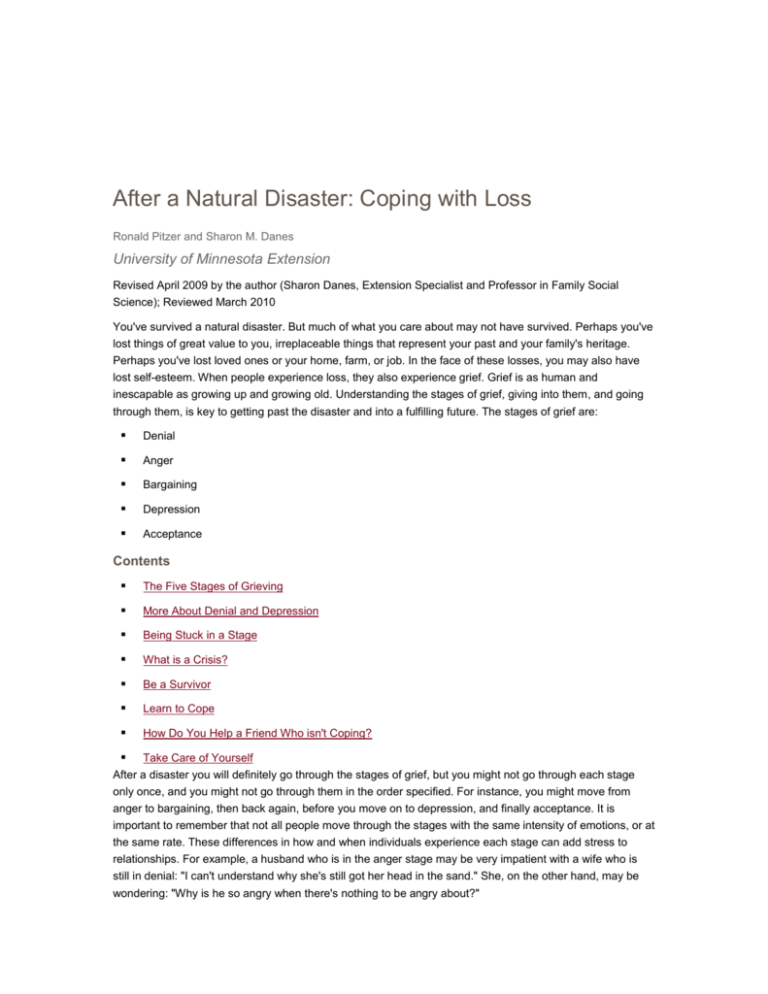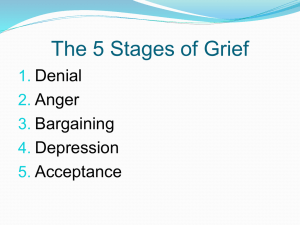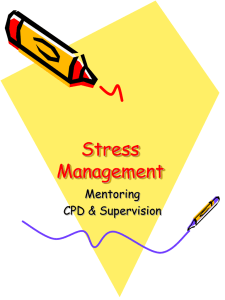After a Natural Disaster
advertisement

After a Natural Disaster: Coping with Loss Ronald Pitzer and Sharon M. Danes University of Minnesota Extension Revised April 2009 by the author (Sharon Danes, Extension Specialist and Professor in Family Social Science); Reviewed March 2010 You've survived a natural disaster. But much of what you care about may not have survived. Perhaps you've lost things of great value to you, irreplaceable things that represent your past and your family's heritage. Perhaps you've lost loved ones or your home, farm, or job. In the face of these losses, you may also have lost self-esteem. When people experience loss, they also experience grief. Grief is as human and inescapable as growing up and growing old. Understanding the stages of grief, giving into them, and going through them, is key to getting past the disaster and into a fulfilling future. The stages of grief are: Denial Anger Bargaining Depression Acceptance Contents The Five Stages of Grieving More About Denial and Depression Being Stuck in a Stage What is a Crisis? Be a Survivor Learn to Cope How Do You Help a Friend Who isn't Coping? Take Care of Yourself After a disaster you will definitely go through the stages of grief, but you might not go through each stage only once, and you might not go through them in the order specified. For instance, you might move from anger to bargaining, then back again, before you move on to depression, and finally acceptance. It is important to remember that not all people move through the stages with the same intensity of emotions, or at the same rate. These differences in how and when individuals experience each stage can add stress to relationships. For example, a husband who is in the anger stage may be very impatient with a wife who is still in denial: "I can't understand why she's still got her head in the sand." She, on the other hand, may be wondering: "Why is he so angry when there's nothing to be angry about?" The Five Stages of Grieving Denial: "No, not me, it can't be true." This is a typical reaction when a person faces a loss. This stage functions as a buffer after the unexpected happens. It allows you to collect yourself and, in time, to find a way to cope. Anger: "Why me?" When the first stage of denial passes, it is likely to be replaced by anger, rage, envy, and resentment. God is often a target for anger, especially in natural disasters. You may also resent people around you who didn't suffer as much loss as you did. Bargaining: "Yes, me, but...." Once you have gotten the anger under control, you may enter the bargaining stage. You may promise God that you'll be good or that you'll do something in exchange for what you need. Bargaining can be a positive way to deal with stress. Whether you bargain with God, with yourself, or with your family, it provides comfort for things you cannot control. It allows you to "frame" the crisis so you can manage it. Bargaining may help you cope with feelings of sadness without experiencing deep depression. Good bargaining skills allow people to see the bright side of even the most difficult situation. Depression: "There is no hope." A crisis entails loss, which is followed by sadness. If you are absorbed by the sadness, you can become depressed. Signs of depression include: changes in usual eating or sleeping patterns, constant moodiness or irritability, lack of energy, feelings of helplessness and hopelessness. Acceptance: "It's all right now." Once the preceding stages have been completely worked through, you will finally be able to accept what has happened, and you may even be stronger than you were before the disaster occurred. Decision Making after Experiencing Losses from Disasters Decision making abilities are affected differently at the various stages of loss. For more information read Decision Making When Change Is Viewed as Loss from the Change: Loss, Opportunity and Resilience publication. More About Denial and Depression Denial: Who will break the silence Denial is the first step in the grieving process. Denying a loss helps us protect ourselves when something painful happens. But getting stuck in denial can be dangerous. Pretending the crisis hasn't happened or won't happen encourages you to delay finding a solution to urgent problems. For example, a father may not acknowledge that he has permanently lost his job, so he sees no reason to look for work. Other family members may also seem unwilling to confront the father with the truth, perhaps because they lack the courage or perhaps because they are also in denial. To deal with denial, families must talk about their situation realistically and openly. This may mean sharing fears and tears. Dealing with loss is easier on everyone when you can: Talk about it. Admit there is a problem. Say what you think, and how things could change. Do something about it. What can be done to reverse the losses? If nothing, what can be done to move forward? What can be done to make your family work again, day by day? Where can you get information and help? Accept the loss. If you can't change it, don't keep fighting it. Find alternatives, other options, and paths to where you want to go. It is only when you stop denying you have a problem, that you can start dealing with it. Activity Think and/or talk about the following questions: What is the problem? We know it won't go away, so what can we do to deal with the problem? How can we do things differently in the future? Depression Depression is an unpleasant stage of grieving. While you may not be able to escape depression completely, there are things you can do to help yourself feel better. Activity List the ways you belittle yourself. For example, you may tell yourself "I'm stupid." Then translate these belittling thoughts into more positive ways of speaking about yourself. Instead of saying I'm stupid, say "I did something stupid, but I'm not stupid. I'll try to do it differently next time." Answer these questions: Am I ready to let go of being depressed? What benefits do I get for being depressed? What payoffs would I get if I let go of my depression? If I was not depressed, what would I be doing? Forgive yourself. Often we are much harder on ourselves than we are on others. Imagine being someone else looking at you and the mistakes you may have made. Are your mistakes really so unforgivable? Is there someone whose forgiveness you need to have? Do you need to make amends? What amends can you make? Learn to like yourself. Often the basis for our depression is the fact that we don't like ourselves. Here are some ways to help you appreciate and like who you are: Think about one thing you like about yourself. Make a good strokes file. It is almost certain that at some time in your life, people said they liked something about you. Jot down that positive stroke on a scrap of paper and put it in a box. Add letters or cards from people who tell you they appreciate you. When you feel down, look in your good strokes file and let yourself enjoy it. Think about what you'd like to have that you're not getting. Support? Affection? Acknowledgment? Someone to listen to you? Write down some of the things you are not getting and think of ways you could get what you need. If that list is hard to come up with, perhaps you can do this activity with a friend. Pamper yourself. Take a soothing hot bath for 30 minutes while listening to your favorite music. Take a walk. Lie under a tree and relax. Think of something you can do each day to pamper yourself. Get busy doing things you enjoy. Be with friends. Go to a ball game. Take time for a long walk. Indulge in your hobby. You deserve to enjoy life. Being Stuck in a Stage Sometimes people can get stuck in a stage. Some people may not be able to move on beyond denial. Others can stay locked in anger, focusing their rage on themselves or someone else whom they blame for their situation and for their suffering. Still others get stuck in depression and isolation. While everyone who survives a disaster needs the support of family and friends, people who are stuck for several weeks or more in serious denial, anger, or depression may also need the helping hand of a professional counselor who can guide them into the next stage of grieving. If you feel that you might need the helping hand of a professional counselor, you can find a therapist near you through the "Qualified Therapist Locator". All counselors on the website are licensed therapists belonging to the American Association for Marriage and Family Therapy. To find a counselor near you,visit TherapistLocator.net. Then click on "Search in the U.S.". You select the number of miles within which you want to search. What is a Crisis? After a crisis, your life will never be exactly the same again. You may try to deal with the crisis using the same strategies that have always worked for you. But your life has changed dramatically and the strategies that used to work in the past might not work now. You may need to be open to learning new ways to help you and your family cope. A crisis: Hits suddenly, without warning. Threatens our security. Has unpredictable consequences. Erodes our self-confidence. Helps us redefine our values. Be a Survivor People who survive crises well have common characteristics: They have people who stand by them, supported them, and give them a sense of hope. They understand the magnitude of what they have lost. They learn to forgive themselves for their mistakes and for surviving. They learn to accept their own good qualities. They have given themselves a reason to live. Learn to Cope Activity People who cope well after a crisis have certain skills that are listed below. The first line lists a good coping skill. The second asks whether you are using that skill to get through your crisis. Answer these questions yourself or pose them to your partner, spouse, or children. Discuss your answers with each other. Think of ways to use these skills to help yourself or your family. People who cope well understand the grieving process and how to get through it. Where are you in the grieving process? Anger, denial, bargaining, depression, or acceptance? (See The 5 Stages of Grieving.) Talk about the stage you are in now and how you see it showing up in your life. What stages are your family members in? What helps you move through the grieving process? People who cope well have the ability to realistically assess and confront their situation. Have you completely faced up to your situation? Are you sugar-coating reality or exaggerating the severity of your situation? Have you sought others' perspectives on your situation? People who weather a crisis well search for solutions for their problems. Are you actively searching for a solution? In what ways? With what effects or results? Are you willing to discuss your problem with others? Why or why not? Who can help you with your problems? What is keeping you from involving others in your problems? What help do you need in order to find solutions to your problems? People who cope well don't blame themselves or others. Who are you blaming for your problems? Does blaming yourself or others help to solve the problems you are facing? How can you refocus blaming into more constructive ways to solve problems? People who cope well can talk about their situation, their fears, anxieties, and sorrows. Have you been talking with people, or have you been avoiding others? Are you talking about what's really bothering you, or are most of your conversations superficial? People who cope well can accept and even ask for help. Are you comfortable asking for help? Do you let people do things for you? How Do You Help a Friend Who isn't Coping? Many people who have trouble coping with loss need help, but don't reach out for it. In these cases you, as a friend, neighbor, or family member, may want to be assertive in freely giving your help. Perhaps you could: Show you care, by words and actions. Small kind deeds and sincere affection or concern mean a lot. A friendly arm around a shoulder, a few words of support, or an invitation to talk may be appreciated more than you know. Help the person accept help. People who have a hard time working through a loss may brush off offers of assistance and persist in the fantasy that everything is fine. Try to make it easy for them to accept help. Be assertive. Ask "When can I come over and help out?" or say "I'll be over at 3 o'clock to help you paint the living room." Help with everyday tasks. When a person is feeling disoriented and troubled, just keeping up with the routine demands of life can be too much. Maybe you could cook dinner, do the dishes, care for a child, mow the lawn, cook a meal, clean the house, or do the shopping. Don't forget children need attention, too. You may want to take them to the zoo, for a bike ride, a walk in the woods, to a movie, or maybe you could just play games together. Encourage the survivors to talk. Talking can release pent-up emotions and clear the way for people to confront their loss. Often people can see their situation more objectively when they talk to those who are willing to listen. Be a good listener. Try to keep your mouth shut and your ears open. Don't advise, analyze, or judge the person by saying things like: "Don't be so emotional," or "That's not worth worrying about," or "I think you should......". Instead say things that encourage the person to keep talking: "Tell me more about that." "How do you feel about that?" "I can see this bothers you." "How can I help you resolve this?" Unfortunately, family members and friends are often poor listeners, not because they don't care, but because they want to make things better, to give advice, to solve the problem. Instead, follow these rules of good listening. Try not to: Draw conclusions. Pass judgment until you have understood what the other person said. Change what the other person has said. Interrupt or change the subject. Dispute the other person's feelings. Judge the other person's motives. Finish thoughts or sentences for the other person. Do "wishful listening" (hear only what you want to hear). Rehearse your response while the other person is talking. Rush the other person. Encourage solutions. Help the person come up with solutions for the near future and encourage them to work toward those solutions. Help them find the resources to cope. Tell them it is a sign of strength and maturity to accept help. You may have to help them get the help they need by making appointments or going with them once appointments are made. Help survivors have fun. Suggest doing something you know they like to do and make it easy for them to get out and do it. Make a list of activities you both enjoy; choose one activity you can do together each week. Take Care of Yourself After a disaster there is so much to do - so many people to take care of - you can easily minimize the importance of taking care of yourself. But remember, it takes physical and emotional energy to rebuild, and the fact is - if you don't take care of yourself first - if you become physically ill, or emotionally unbalanced, you will cause more problems than you'll fix. Do things to assure your physical, mental, and emotional well-being. When you are emotionally drained, you need a healthy body more than ever. The following good health habits can make your emotional recovery faster and easier: Getting a good night's sleep; don't take daytime naps. Eating healthy foods, avoid alcohol, caffeine, and junk foods. Exercising, even if it is just taking a walk every day. Just as bodies need nourishment, minds need rejuvenating. This is why it is important to treat yourself to activities you enjoy like: Doing fun things with your family. Doing something by yourself once a day that you find relaxing. Spending time with friends. Find people you can lean on. Finding support is crucial to coping with loss. Often the people who can help you most are your friends and family. But no matter how close these people are to you, they aren't mind readers. Before they can help, you have to be willing to explain how you feel and what you need. Activity Complete each of these statements out loud. When everyone in your family has completed the first statement, go on to the second, and so on. Because of what has happened, I feel.............. I need.............to feel better about my loss. I will do.........to help me cope better with my loss. I need...........from my family to help me cope. I can do..........for my family to help them cope. Sometimes friends and family members aren't the best people to talk to. Who else can you go to for support? This project was originally funded by FEMA through the Minnesota Department of Human Services - Mental Health Division, in cooperation with CLIMB (Creative Learning Ideas for Mind and Body) and the University of Minnesota Extension. Sources Caramody, John (1993). How to Handle Trouble: A Guide to Achieving Peace of Mind. Doubleday. Danes, S.M. (1999). Change; Loss, Opportunity, and Resilience. University of Minnesota Extension publication FO-7421-S. Lord, Janice Harris (1990). Beyond Sympathy: What to Say and Do for Someone Suffering an Injury, Illness, or Loss. Ventura, CA: Pathfinder Publishing. Rando, Therese (1984). Grieving: How to Go on Living When Someone You Love Dies. Lexington: D.C. Heath and Company. Riehle, Kathleen A (1991). What Smart People Do When Losing Their Jobs. New York: John Wiley and Sons. Sanders, Catherine M (1989). Grief: The Mourning After. New York: John Wiley and Sons. Veninga, Robert (1985). A Gift of Hope: How We Survive Our Tragedies. Little, Brown and Company. Wilken, Carol S. and Joyce Powell (1993). Learning to Live Through Loss. Manhattan KS: Kansas State University Cooperative Extension Service. (Series of five booklets)







